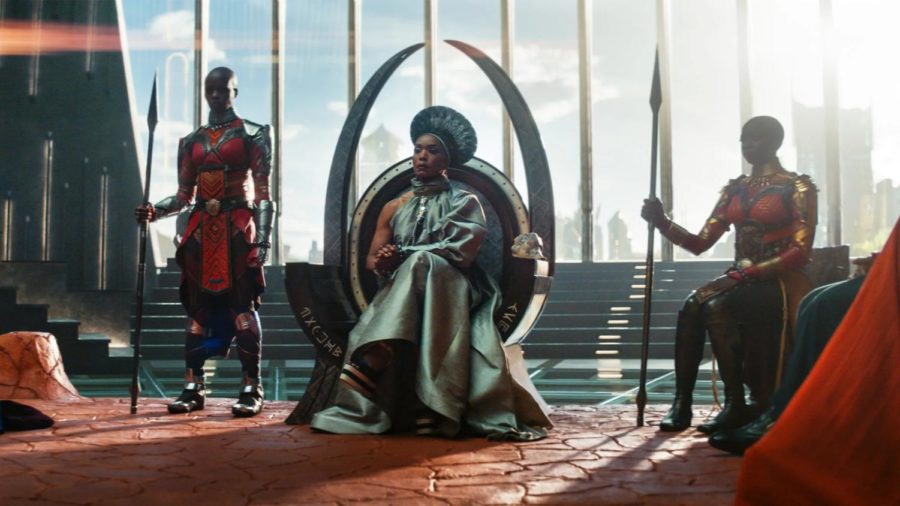“Black Panther: Wakanda Forever” is a continuation of Chadwick Boseman’s groundbreaking work
Queen Ramonda (center), played by Angela Bassett, successfully leads Wakanda in the newest “Black Panther” movie following the death of actor Chadwick Boseman in 2020.
November 18, 2022
The recent release of “Black Panther: Wakanda Forever” has been a bittersweet one, continuing the beloved series without its leading actor. The film portrays the grief of a community following the death of King T’Challa, which coincides with the death of his actor Chadwick Boseman in 2020. It effortlessly serves as a tribute to the actor while simultaneously continuing the series, but does so in a way that acknowledges the major loss that has occurred both within the franchise and in the real world. Unlike other films in the genre, “Wakanda Forever” is able to successfully tackle difficult topics without controversy or by reverting to comedy as a means of representing the grieving process. It allows viewers to witness the hole that the actor’s death left in the franchise and reflect on what he meant to us all.
In 2018, the first “Black Panther” marked the beginning of a major shift in representation for Black people on the big screen and Chadwick Boseman’s portrayal suggested the rise of a new star within the Marvel Cinematic Universe (MCU). The film was the first of its kind to tackle the tough issues of being Black in both Africa and America. Later films continued to discuss these topics, providing much needed representation in a genre that had been lacking for so many years. It was the first series with a predominantly Black cast and, in having one, proved that narratives about Black lives could be immensely profitable if they were given the proper attention. From the beginning, “Black Panther” struck the heartstrings of its viewers and instantly became a fan favorite, proving to be both entertaining and an important touchstone in the conversation about representation.
Throughout the new film, Marvel does not shy away from portraying the grief that fans of the series have experienced since the death of Boseman and centers around the hole that it left in the series. In the film, T’Challa’s mother Queen Ramonda (Angela Bassett) has come into power, struggling to lead a broken Wakanda in an international community that is vying for their resources, while also dealing with the grief of losing her child. The nation mourns the loss of their king and their Black Panther as well. The mantle of the Black Panther can no longer be carried on as all of the power-giving heart-shaped herb was destroyed by Killmonger in the previous film. As such, the nation believes that they have been left without a protector. T’Challa’s sister Shuri (Letitia Wright) also struggles with grief and her expectations as a leader in Wakanda. It is evident that the death of King T’Challa has drastically changed the trajectory of the Wakandan nation as well as the franchise as a whole.
At the beginning of the film, we see Wakanda struggling in their role as the most powerful nation on the planet. The world powers want to harness the powerful metal vibranium—which is thought to be only found in Wakanda—and use it for their own benefit, a claim which Wakanda is adamantly opposed to. Therefore, the countries try to take it by force, only to be thwarted by the Dora Milaje, Wakanda’s special forces. Queen Ramonda gives a passionate speech about the ramifications of attempting to acquire Wakandan resources, believing that they are the only nation that possesses vibranium. However, Queen Ramonda and Shuri quickly learn that they are not the only ones, as they are introduced to the underwater nation of Talokan and its leader Namor (Tenoch Huerta), a demi-god of sorts. The United States has created a machine with the help of a teenage scientist named Riri Williams (Dominique Thorne) that is able to detect vibranium, and accidentally discovers Talokan. Namor seeks out the Wakandans, asking them to bring the scientist to him so that no other such machines can be created. However, when Shuri refuses to let him kill the scientist, he suggests an alliance between Wakanda and Talokan to destroy the surface world that had enslaved his people. Shuri rejects the proposal and war between the two nations breaks out, forcing Shuri to revisit her plans to recreate the heart-shaped herb and bring back the Black Panther.
Without spoiling too much of the film, the war between Talokan and Wakanda leads to the death of another major character in the franchise, forcing the remaining characters to grieve yet again. The film, already struggling with the loss of its leading actor, takes a drastically dark turn as the war forces the Wakandans to confront their emotions and their place in the world.
Overall, “Black Panther: Wakanda Forever” presents a heartbreaking continuation of the “Black Panther” saga, dealing with the feelings of loss and grief for both the characters and the actors. The film contained several tributes to Chadwick Boseman that left the theater absolutely silent other than sniffles. There is also a gut-wrenching post credit scene that will have you pulling your tissues back out. The film has been a major box-office success in its opening weekend and will surely continue to rack in huge viewership. I highly recommend checking out this movie, even if you aren’t an avid fan of the MCU. It will surely have you on the edge of your seat and sobbing: a duality that is unmatched within the genre.




